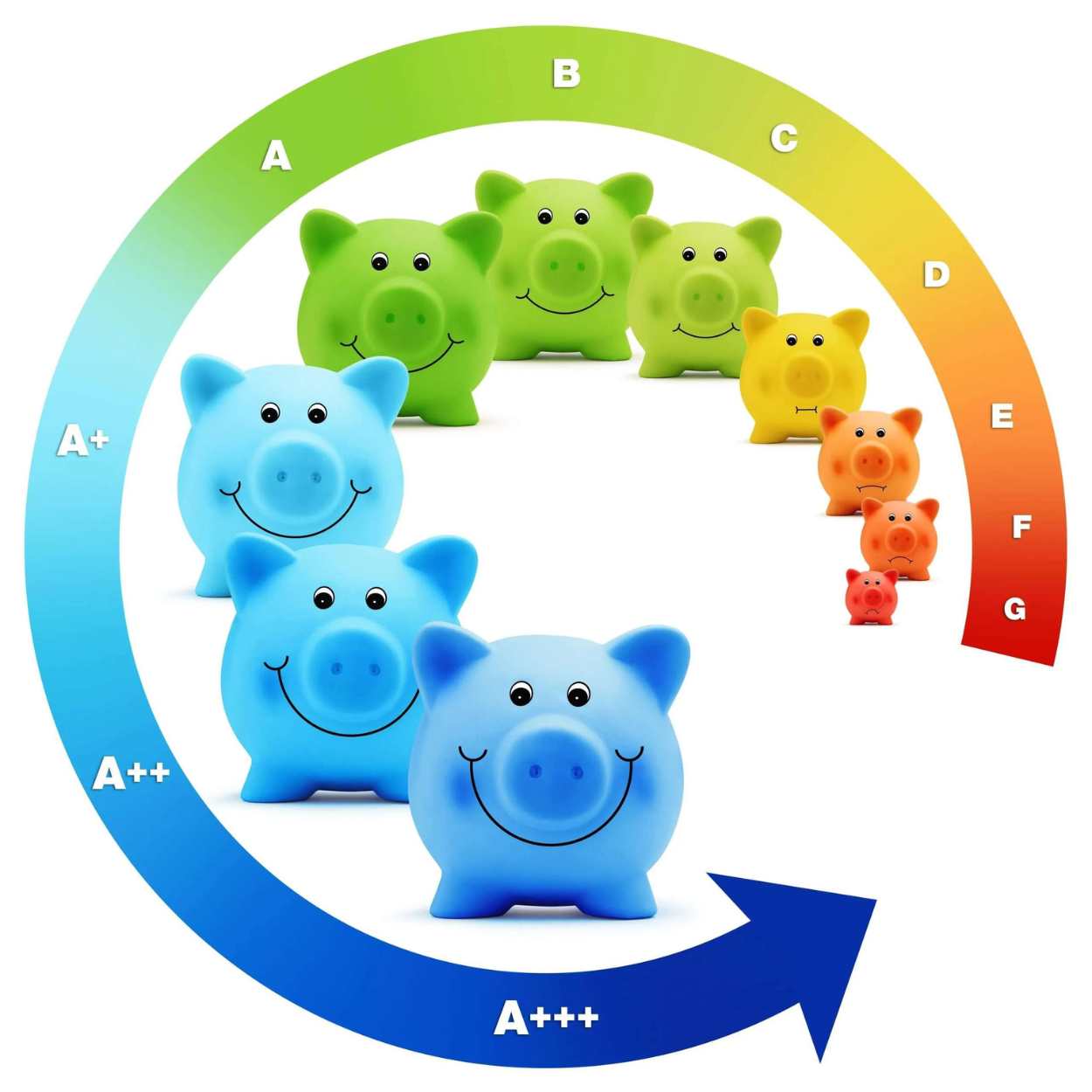
Energy Efficiency & Home Improvements
Home energy efficiency solutions
Energy-efficient home improvements can be made so that your house consumes less energy, reducing carbon emissions and lower energy bills. Improved insulation, upgrading to more efficient boilers and appliances as well as installing renewable energy sources such as solar panels can all contribute to a more energy-efficient home.
There is now government funding to support these energy efficiency improvements, check if you are eligible for ECO4

How to tell if you need to improve your home’s energy efficiency?
High energy bills
If you are spending a lot of money on your energy bills, it may be worth considering one or more of these products to help reduce your energy consumption.
Drafty or cold rooms
If you have rooms in your home that are drafty or always feel cold, it may be a sign that your home is not properly insulated. Insulation products can help to prevent heat loss and make your home feel warmer and more comfortable.
Old or inefficient heating system
If your heating system is old or inefficient, it may be worth upgrading to a newer, more efficient model. Newer products can help to reduce your energy consumption and lower your energy bills.
Interest in renewable energy
If you are interested in reducing your carbon footprint and using more renewable energy sources, products like solar panels or heat pumps can help you become greener.
ECO funding
If you are concerned about the cost of upgrading your home energy efficiency, you should know that you might be eligible for grants, using the ECO4 or GBIS funding available.
If you are a homeowner in the UK and are looking to reduce your energy bills, improve the energy efficiency of your home, or make your home more environmentally friendly, you may want to consider which of these products are right for you. Here are some factors to consider when determining which improvement is right for you.
Home Insulation
Home insulation plays a huge part in making your home more energy efficient. Proper insulation helps to create a thermal barrier that prevents heat from escaping during cold weather and entering during hot weather. This results in a more comfortable living environment and reduced reliance on heating and cooling systems. The main benefit of this energy saving can lead to lower utility bills.

Solid Wall Insulation
Solid wall insulation involves insulating the external walls of a home to reduce heat loss and make the home more energy efficient.
The benefits of using solid wall insulation include:
-
Lower energy bills: Solid wall insulation can help to reduce heat loss and lower energy bills.
-
Warmer home: By retaining heat within the home, solid wall insulation can help to keep homes warmer for longer.
-
Improved aesthetics: Solid wall insulation can also help to improve the appearance of a home, as it can be finished with a variety of decorative coatings.

Loft Insulation
Loft insulation is adding insulation to the loft or attic space of a home to reduce heat loss through the roof.
The benefits of using loft insulation include:
-
Lower energy bills: Loft insulation can help to reduce heat loss and lower energy bills.
-
Warmer home: By preventing heat from escaping through the roof, loft insulation can help to keep homes warmer for longer.
-
Quick installation: Loft insulation can be installed quickly and easily, only taking 2 hours for some 3-bedroom homes.

Internal Wall Insulation
Internal wall insulation involves installing insulation on the interior walls of a home to reduce heat loss and make the home more energy efficient.
The benefits of using internal wall insulation include:
-
Lower energy bills: Internal wall insulation can help to reduce heat loss and lower energy bills.
-
Warmer home: By retaining heat within the home, internal wall insulation can help to keep homes warmer for longer.
-
Improved acoustics: Internal wall insulation can also help to improve the acoustics of a home, reducing noise between rooms.

Cavity Wall Insulation
Cavity wall insulation involves filling the gap between the walls in a home with insulating material.
The benefits of using cavity wall insulation include:
-
Lower energy bills: Cavity wall insulation can help to reduce heat loss and lower energy bills.
-
Warmer home: By preventing heat from escaping through the walls, cavity wall insulation can help to keep homes warmer for longer.
-
Quick installation: This type of insulation can be installed quickly and easily, with minimal disruption to the home.

Air Source Heat Pump
Air source heat pumps (ASHP) are a heating and cooling system that extracts heat from the outdoor air and transfers it indoors.
The benefits of using air source heat pump include:
-
Energy efficiency: ASHPs are highly efficient, reducing energy bills.
-
Lower carbon footprint: They produce fewer emissions, helping combat climate change.
-
Versatility: ASHPs provide both heating and cooling for year-round comfort.

Boiler Upgrades
Replacing an old, inefficient boiler with a new, modern, and energy-efficient model can be extremely beneficial to your monthly bills.
The benefits of using a modern boiler include:
-
Lower energy bills: A modern boiler is more energy-efficient than an old, inefficient one, which can help to lower energy bills by up to £445 per year.
-
Reduced emissions: A modern boiler produces fewer emissions than an old, inefficient one, making it a more environmentally friendly heating solution.
-
Improved reliability: A modern boiler is less likely to break down or need maintenance.

Solar PV Panels
Solar PV refers to photovoltaic panels that generate electricity from sunlight and there has never been a better time to install them on homes.
The benefits of using solar panels include:
-
Lower energy bills: By generating their own electricity, homeowners can reduce their reliance on the grid and lower their energy bills.
-
Renewable energy source: Solar panels use a renewable energy source and they don’t produce any emissions, making them a green source of energy.
-
Long lifespan: Solar PV panels have a long lifespan and can last for over 25 years, making them a cost-effective investment.

Electric Storage Heaters
Electric storage heaters are heating systems that store heat during off-peak hours when electricity is cheaper and releases it during peak hours, lowering heating energy bills.
The benefits of using an electric storage heater include:
-
Lower energy bills: By taking advantage of off-peak electricity tariffs, electric storage heaters can help to lower energy bills.
-
Easy to install: Electric storage heaters are easy to install and require minimal maintenance.
-
No emissions: Unlike gas boilers, electric storage heaters do not produce any emissions, making them a more environmentally friendly heating solution.
Energy Efficiency Upgrades
When it comes to choosing the correct type of energy efficiency upgrade for your home, making an informed decision can lead to significant benefits. Most importantly, it can result in large cost savings on energy bills, as efficient upgrades reduce energy consumption. The right upgrades can enhance the overall comfort and livability of your home by improving insulation, reducing drafts, and maintaining consistent temperatures. By reducing energy consumption, these upgrades also contribute to reducing carbon emissions and creating a more sustainable environment.
